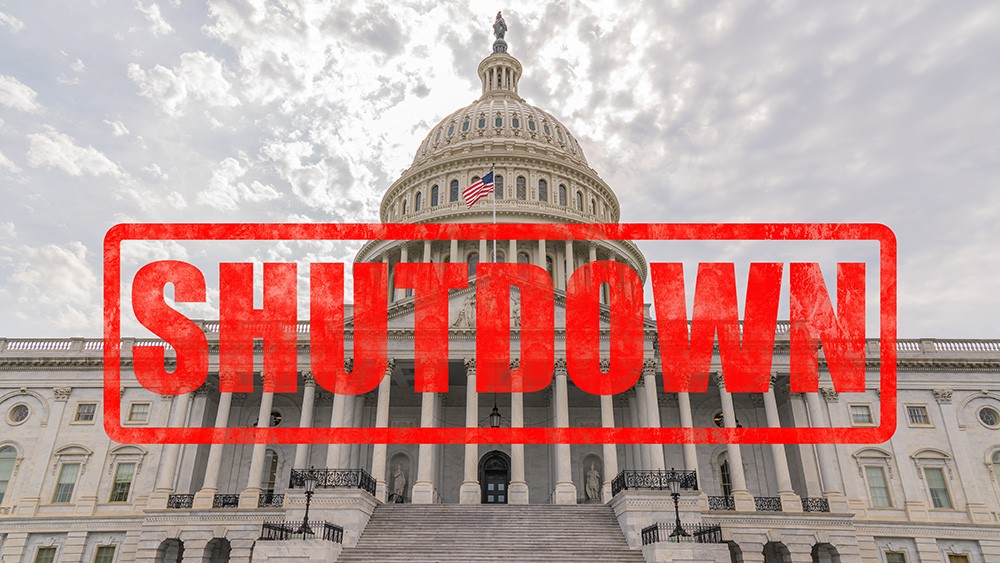*Editors Note: This story has been updated from its initial version published on January 3, 2019 to include more accurate and up-to-date information. Meetings Today is following this developing story closely. Check this page frequently for updates.
The impending government shutdown could cost the U.S. travel economy $1 billion per week and create widespread holiday season travel disruptions, according to a U.S. Travel Association.
In a December 20, 2024, media release, the organization claimed previous holiday shutdowns have cost the U.S. economy $11 billion.
“A prolonged government shutdown threatens holiday travel disruptions that Americans won’t tolerate," said Geoff Freeman, president and CEO of U.S. Travel Association, in the release. “It’s hard to see how anyone in Congress wins if they force TSA workers, air traffic controllers and other essential employees to work without pay during one of the busiest travel periods of the year.”
U.S. Travel used a survey by Ipsos to bolster its argument:
- 60% of Americans would consider altering their travel plans if a government shutdown occurs, with many choosing to cancel or avoid flights altogether.
- Both political parties would bear responsibility for the resulting economic losses and inconveniences to travelers.
- An overwhelming majority of Americans—81%—agree that government shutdowns hurt the economy, while 86% say they inconvenience air travelers.
- 83% of respondents believe that shutdowns negatively affect businesses reliant on air travel and tourist destinations, such as national parks, museums and local businesses.
- Nearly nine in 10 Americans (88%) believe members of Congress from both parties should work together to prevent a shutdown. Furthermore, 69% of voters say they would be less likely to support a member of Congress who voted in favor of a shutdown.
The organization added that the failure of Congress to pass disaster relief funding, which would also be impacted by a shutdown, would delay the recovery of travel still recovering from recent natural disasters, claiming that a delay of emergency relief funding could push the recovery timeline for destinations in North Carolina and Tennessee well into 2026 and beyond.
"As the clock ticks, the American people cannot afford further delays in recovery. The urgency of passing a disaster relief bill is clear, not just for the economic health of impacted states, but for the livelihoods of millions of Americans dependent on travel-related businesses," Freeman said.
Following is coverage from a previous government shutdown, in 2019, with evergreen information from meetings and events industry thought-leaders about what it means for planners:
How the Government Shutdown Affects Meetings
Meeting and event planners should mostly be concerned in two areas: speaker and attendee availability.
 “The loss of any government employees that were scheduled to attend meetings or conferences [is a major concern],” said Roger Rickard, founder of Voices in Advocacy and the leading speaker and consultant on how meeting professionals can advocate for the industry to lawmakers.
“The loss of any government employees that were scheduled to attend meetings or conferences [is a major concern],” said Roger Rickard, founder of Voices in Advocacy and the leading speaker and consultant on how meeting professionals can advocate for the industry to lawmakers.
“If they were to attend different trade organization events—science, technology, healthcare and physical and cyber security—the government plays a major role in those conferences," he added.
"I could see those conferences being affected not only by attendance but in the sessions delivered by some of the people in the government ranks."
Because the shutdown is happening over a holiday season, during the slowest time on the meetings and conventions calendar, the impact on the industry will be lessened.
“If they were doing this in June or July, that story may differ,” Rickard said. “If this continues for weeks or months on end, then I think the impact will be much greater, because people who were scheduled to participate in February or March may indicate that they don’t know whether they’ll be there.”
Another major negative impact could be the handing of visas for international attendees, according to Rickard.
“There are about 700,000 [federal employees] not working and 400,000 working but not getting paid, so I’m not sure exactly who handles the visas,” Rickard said.
“Are they counted as essential personal and still working or not?" he asked. "That I can’t answer.”
By their nature, government meetings will be affected the most.
Rickard said he agrees that government meetings would most likely face the brunt of the shutdown.
“It depends on the department, because 75 percent of the government is funded,” he said. “This 25 percent that is not funded is where the fight is over, so that’s where the fight is at this time.
“If you’re the planner, reconfirm whether any type of government employee is still able to participate in the content and then take appropriate steps during the shutdown,” Rickard added. “You may not get the answer, but if you’re not getting an answer from them that’s probably your answer right there.”
Washington, D.C. Is Open for Meetings Business
One meetings industry leader who is speaking up is Elliott L. Ferguson II, president and CEO of Destination DC.
 “In any instance of a federal government shutdown, D.C. is still open for business and we work closely with customers to ensure a successful event,” Ferguson said.
“In any instance of a federal government shutdown, D.C. is still open for business and we work closely with customers to ensure a successful event,” Ferguson said.
“If planners are utilizing museums operated by the federal government for off-site venues, we will facilitate other options, such as new venues at The Wharf or the Newseum," he added.
Ferguson shared additional insights on the 2019 shutdown at Convening Leaders 2019:
A Former Government Meeting Planner Speaks Out
Retired government meeting planning veteran Garland Preddy, who is also the director of education and training for the Society of Government Meeting Professionals (SGMP), has some words of advice for current government meeting planners.
 “I retired 10 years ago after 34 years of doing events for the federal government,” Preddy said. “During that time there was never but one shutdown that caused furlough of ‘non-essential’ government workers.
“I retired 10 years ago after 34 years of doing events for the federal government,” Preddy said. “During that time there was never but one shutdown that caused furlough of ‘non-essential’ government workers.
Preddy said that the ability to attend a meeting largely depends on what federal government department the attendee or speaker is in.
"Travel would have been restricted for anyone that was in one of the departments effected by the shutdown," she said. "So if they had planned on attending a meeting they likely could not. Depending on the level of meetings planned they may have been canceled if they were not deemed essential.
“As you know, during a continuing resolution, agencies can continue with programs they were funded for in the previous fiscal year, but new programs must wait until an appropriation is passed,” she continued.
Preddy offered the following words of warning, however.
“Hosting events during a CR [continuing resolution] or shutdown may appear frivolous and will certainly be scrutinized by the media and Congress,” she said.
[From the Archives: How a Government Shutdown Would Impact Meetings]







